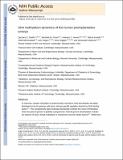| dc.contributor.author | Smith, Zachary D. | |
| dc.contributor.author | Chan, Michelle Mei Wah | |
| dc.contributor.author | Humm, Kathryn C. | |
| dc.contributor.author | Karnik, Rahul | |
| dc.contributor.author | Mekhoubad, Shila | |
| dc.contributor.author | Regev, Aviv | |
| dc.contributor.author | Eggan, Kevin | |
| dc.contributor.author | Meissner, Alexander | |
| dc.date.accessioned | 2015-04-23T14:50:27Z | |
| dc.date.available | 2015-04-23T14:50:27Z | |
| dc.date.issued | 2014-07 | |
| dc.date.submitted | 2013-09 | |
| dc.identifier.issn | 0028-0836 | |
| dc.identifier.issn | 1476-4687 | |
| dc.identifier.uri | http://hdl.handle.net/1721.1/96731 | |
| dc.description.abstract | In mammals, cytosine methylation is predominantly restricted to CpG dinucleotides and stably distributed across the genome, with local, cell-type-specific regulation directed by DNA binding factors. This comparatively static landscape is in marked contrast with the events of fertilization, during which the paternal genome is globally reprogrammed. Paternal genome demethylation includes the majority of CpGs, although methylation remains detectable at several notable features. These dynamics have been extensively characterized in the mouse, with only limited observations available in other mammals, and direct measurements are required to understand the extent to which early embryonic landscapes are conserved. We present genome-scale DNA methylation maps of human preimplantation development and embryonic stem cell derivation, confirming a transient state of global hypomethylation that includes most CpGs, while sites of residual maintenance are primarily restricted to gene bodies. Although most features share similar dynamics to those in mouse, maternally contributed methylation is divergently targeted to species-specific sets of CpG island promoters that extend beyond known imprint control regions. Retrotransposon regulation is also highly diverse, and transitions from maternally to embryonically expressed elements. Together, our data confirm that paternal genome demethylation is a general attribute of early mammalian development that is characterized by distinct modes of epigenetic regulation. | en_US |
| dc.description.sponsorship | National Institutes of Health (U.S.) (Pioneer Award 5DP1OD003958) | en_US |
| dc.description.sponsorship | Burroughs Wellcome Fund (Career Award at the Scientific Interface) | en_US |
| dc.description.sponsorship | National Human Genome Research Institute (U.S.). Centers of Excellence in Genomic Science (1P50HG006193-01) | en_US |
| dc.language.iso | en_US | |
| dc.publisher | Nature Publishing Group | en_US |
| dc.relation.isversionof | http://dx.doi.org/10.1038/nature13581 | en_US |
| dc.rights | Creative Commons Attribution-Noncommercial-Share Alike | en_US |
| dc.rights.uri | http://creativecommons.org/licenses/by-nc-sa/4.0/ | en_US |
| dc.source | PMC | en_US |
| dc.title | DNA methylation dynamics of the human preimplantation embryo | en_US |
| dc.type | Article | en_US |
| dc.identifier.citation | Smith, Zachary D., Michelle M. Chan, Kathryn C. Humm, Rahul Karnik, Shila Mekhoubad, Aviv Regev, Kevin Eggan, and Alexander Meissner. “DNA Methylation Dynamics of the Human Preimplantation Embryo.” Nature 511, no. 7511 (July 23, 2014): 611–615. | en_US |
| dc.contributor.department | Massachusetts Institute of Technology. Department of Biology | en_US |
| dc.contributor.mitauthor | Regev, Aviv | en_US |
| dc.relation.journal | Nature | en_US |
| dc.eprint.version | Author's final manuscript | en_US |
| dc.type.uri | http://purl.org/eprint/type/JournalArticle | en_US |
| eprint.status | http://purl.org/eprint/status/PeerReviewed | en_US |
| dspace.orderedauthors | Smith, Zachary D.; Chan, Michelle M.; Humm, Kathryn C.; Karnik, Rahul; Mekhoubad, Shila; Regev, Aviv; Eggan, Kevin; Meissner, Alexander | en_US |
| dc.identifier.orcid | https://orcid.org/0000-0001-8567-2049 | |
| mit.license | OPEN_ACCESS_POLICY | en_US |
| mit.metadata.status | Complete | |
